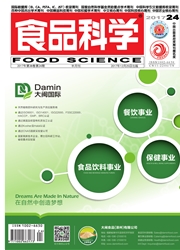

 中文摘要:
中文摘要:
乳中特定的活性肽可以有效地抑制血管紧张素转化酶(ACE)的活性,起到抗高血压的作用。但是乳源ACE抑制肽由于结构不同,经口服后并不都能通过小肠黏膜进入血液循环,因此并不都具有降血压的功效,口服生物利用度也较低。本文介绍乳源ACE抑制肽的研究现状和活性评价方法,概述利用Caco-2细胞模型研究乳源ACE抑制肽在小肠中的摄入、小肠细胞中滞留代谢及小肠外排机制的研究进展,并对如何提高乳源ACE抑制肽的口服生物利用度提出展望。
 英文摘要:
英文摘要:
The specific active peptides in milk can inhibit the activity of angiotensinⅠ-converting enzyme effectively to execute antihypertensive effect.Due to different structures of milk-derived ACE inhibitory peptides,the peptides are not able to pass through the intestinal mucosa into blood circulation when administered orally.Therefore,not all ACE inhibitory peptides have the function of lowering blood pressure and a low oral bioavailability.This article has introduced current research status and activity evaluation as well as the intestinal absorption mechanism of milkderived ACE inhibitory peptides,which includes intestinal ingestion,metabolic activity and intestinal excretion using Caco-2 cell model.In addition,a prospect of improving oral bioavailability of milk-derived ACE inhibitory peptides has also been proposed.
 同期刊论文项目
同期刊论文项目
 同项目期刊论文
同项目期刊论文
 Puri?cation and characterization of α-acetolactate decarboxylase (ALDC) from newly isolated Lactococ
Puri?cation and characterization of α-acetolactate decarboxylase (ALDC) from newly isolated Lactococ Antioxidant activity of phosphorylated exopolysaccharide produced by Lactococcus lactis subsp lactis
Antioxidant activity of phosphorylated exopolysaccharide produced by Lactococcus lactis subsp lactis Antioxidant and immunomodulatory activity of selenium exopolysaccharide produced by Lactococcus lact
Antioxidant and immunomodulatory activity of selenium exopolysaccharide produced by Lactococcus lact Antioxidantandimmunomodulatoryactivityofseleniumexopolysaccharide producedby Lactococcuslactis subsp
Antioxidantandimmunomodulatoryactivityofseleniumexopolysaccharide producedby Lactococcuslactis subsp 期刊信息
期刊信息
